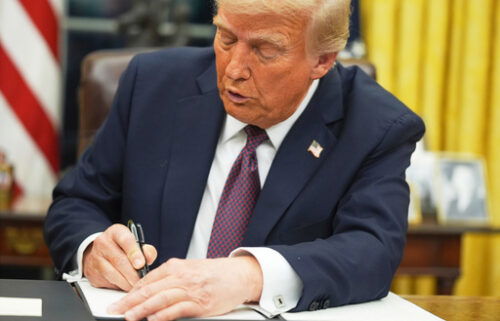Tax cuts pushed by GOP leaders and the governor advance, but a tough vote is ahead

By Associated Press
TOPEKA, Kan. — Top Republican lawmakers and the Democratic governor in Kansas advanced their compromise plan to cut the state’s taxes Thursday, but the last vote the measure faced involved a large and bipartisan group of critics.
The state Senate voted 38-1 to approve the plan, which would reduce income, sales and property taxes by a total of $1.4 billion over the next three years. Gov. Laura Kelly and the GOP-controlled Legislature’s top Republicans brokered a deal Wednesday after the GOP leaders gave up on moving Kansas to a single-rate personal income tax that Kelly strongly opposed.
The show of broad, bipartisan support typically is a good sign for a vote in the House, but the opposition there was much fiercer. Critics in both parties didn’t think it did enough to cut property taxes; conservative Republicans were upset that it preserved the current three personal income tax rates; and Democrats thought a cut in the top personal income tax rate from 5.7% to 5.5% skewed the plan too much toward wealthy taxpayers.
Frustration with the plan and Kelly’s intervention was palpable when the governor met Thursday with House Democrats to sell it. She touted it as a big victory for Democrats.
“I can guarantee that the other side has gone as far as — a lot farther than — they wanted to go,” Kelly told them. “We should be embracing this and taking credit for it.”
The Kansas deal came two weeks after Georgia’s Republican-controlled Legislature passed personal and corporate income tax cuts that GOP Gov. Brian Kemp favored. Like Georgia, Kansas has a big budget surplus — still projected at more than $4 billion for the end of June 2025.
A dozen other states cut their income tax rates last year, according to the conservative Tax Foundation, but major tax cuts were thwarted in Kansas by the dispute between Republican leaders and Kelly over a GOP proposal for a single-rate, “flat” income tax, something Kelly said would benefit the “super wealthy.”
Kelly vetoed a plan with a single-rate income tax in January, and Republicans were unable to muster the two-thirds majorities in both chambers needed to override her action.
Republican leaders wavered on a single-rate income tax in recent weeks as they grew less willing to chance having no cuts enacted this year. All 40 state Senate seats and 125 House seats are up for election this year.
“We’ve got to get something, and this is a compromise,” said House Speaker Dan Hawkins, a Wichita Republican. “We need to get it done and get out of here.”
Besides adjusting the state’s personal top income tax rate, the bill also would eliminate state income taxes on retirees’ Social Security benefits, which kick in once a person receives $75,000 a year. It would also increase the state’s standard personal income tax deductions, increase an income tax credit for child care expenses, reduce property taxes the state imposes to raise money for public schools and end an expiring 2% sales tax on groceries six months early, on July 1.
“We’ve been at this a long time,” Senate President Ty Masterson, a Wichita-area Republican told his colleagues during a short debate. “In the true spirit of compromise, this is a plan that I think meets the end of the day.”
The latest plan is smaller than separate plans approved last month by each chamber and smaller than one passed by the Republican-controlled Legislature in January that Kelly vetoed. The new plan is less generous than either the House or Senate plans in increasing standard deductions, which helps poorer families.
In the Senate, the only “no” vote came from northeastern Kansas Sen. Tom Holland, who represented Democratic senators in tax negotiations. He called the measure a “pile of mush.”
Holland and some House Democrats said the plan doesn’t cut property taxes enough amid rising home values and local levies. For the owner of a home at the Kansas median value of $210,000, the annual savings would be about $140. A home’s appraised value can easily rise enough in a year to wipe out the cut.
“This, in my mind, is half a Band-Aid when the sore is still festering,” Holland said.
Another problem for many Democrats: The plan would keep a tax rate of 5.2% on a married couples’ income between $30,000 and $60,000 and impose the 5.5% rate after that.
Rep. Rui Xu, a Kansas City-area Democrat, told Kelly the proposal is “pretty close to a flat tax.” Masterson made the same argument in touting it during an interview Wednesday evening.



